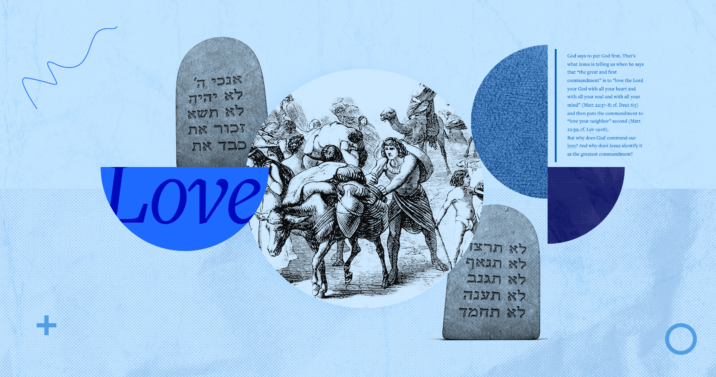God says to put God first. That’s what Jesus is telling us when he says that “the great and first commandment” is to “love the LORD your God with all your heart and with all your soul and with all your mind” (Matt 22:37–8; cf. Deut 6:5) and then puts the commandment to “love your neighbor” second (Matt 22:39; cf. Lev 19:18).
But why does God command us to love him? And why does Jesus identify it as the greatest commandment?
Table of contents
Why does love for God come first?
We might wonder: Does God have some kind of need to be loved more than anyone else? “God forbid!” as the Apostle Paul would say.1
God needs nothing from us. It is we who need God and who gain all good things from loving him. We are the sheep of his pasture (Ps 100:3), and he is the good shepherd who guards and keeps us (John 10:10) and sustains us in the way of life everlasting (Ps 139:24). Our love for him is always playing catch-up to his prior and far more powerful love for us.
So then, is the commandment telling us what we have to do to earn everlasting life with God? God forbid! For he is our Father (Matt 6:9) as well as our shepherd (Ps 23; Ezek 34), and no good father requires his children to earn his love before he loves them. Rather, the law of God warns us that turning away from the love of God means turning toward death, which is why the commandments keep telling us to turn back to God in repentance and faith.
His laws show us why our hope for salvation depends not on anything we can earn, but on the mercy of God. In this way, the commandments fulfill what Martin Luther calls their “evangelical” purpose, directing our hearts toward the place where we find the fullness of God’s mercy and love for his straying sheep: in the εὐαγγέλιον (euangelion), as it is called in New Testament Greek, which is to say, in the gospel of Jesus Christ.
Our God is a jealous God (Exod 20:5). He wants from us an exclusive love, because when his sheep seek other shepherds, trusting in false gods and false gospels, they walk in the ways of death. He commands us to love the LORD our God with our whole heart because we are his possession, the sheep of his hand (Ps 95:7), and he intends for us to flourish. So he commands us to choose life, not death (Deut 30:19).
The greatest commandment in the story of Israel
To see how love for God is the path of life—and also why it is the foundation of the second commandment, to love our neighbors—we can look at four stages in the life of God’s chosen and beloved people, Israel: a life that ends up including all nations in its blessing.
1. The covenant name of God
First of all, to love God we need to know who he is. We can begin by knowing his name.
When Moses asks what is the name by which God should be known in Israel, he replies: “I Am Who I Am” (Exod 3:14). The words in Hebrew could equally well mean: “I Will Be Who I Will Be.” Rather than giving his people a kind of magic word to conjure with, like the names of the gods of other nations, the God of Israel points ahead to who he will show himself to be.
The name of God is rendered in most English Bibles as “LORD” in all-capital letters, which stands for the Hebrew יהוה, best transliterated YHWH, which builds on the Hebrew word for “I AM” (היה, Exod 3:14). It is uncertain how to pronounce the name because ancient Hebrew writing did not include vowels. Long before Jesus’s birth, pious Israelites had stopped saying the sacred name of God aloud and began saying “Lord” instead (Hebrew אֲדֹנָי [adonai]). This is a custom Jesus himself observes, teaching us to pray not by calling upon the name of God aloud but by calling him “Father” (Luke 11:2).
The other New Testament writers follow this custom when they say Jesus is LORD (κύριος). In so doing, they are confessing that the name of the LORD, which is the name above all names, has been given to Jesus (Phil 2:9–11). Jesus is the fulfillment in person of the name of God, the most visible revelation of who God is. “I Will Be Who I Will Be” includes the incarnation of God in Christ the LORD.
2. The covenant promises of God
The Bible moves us along toward this greatest of all revelations when the LORD calls to mind the covenant he made with Abraham, Isaac, and Jacob (Exod 6:3–5). He promises to bring all Israel into this covenant, saying to them, “I will take you to be my people and I will be your God” (Exod 6:7). The words of the covenant are like a wedding vow in which God promises that he will be their Beloved forever. That is who he is and who he will be, as he fulfills the meaning of his name.
It is worth thinking about the power of this kind of promise. It does what love itself cannot do. For no matter how much you love someone, you are not married to them without the wedding vow in which you promise to be theirs for the rest of your life.
We do not make God our own by loving him; he makes himself our own by his words of promise.
So it is with the LORD and his people. We do not make God our own by loving him; he makes himself our own by his words of promise. By his word, the LORD becomes the God of Abraham, and then the God of Israel, and then the God who gives himself to all humanity in the incarnation of Christ, the Bridegroom who is preached to all nations in the gospel.
3. Covenant fidelity to God
We come to a third element of what’s involved in loving God when we think about what comes of marriage. A marriage is a whole life together for a man and a woman, which turns this man into her man, and this woman into his woman.
Likewise, what follows from the covenant between the LORD and his people Israel is a whole life together for God and his people, beginning when he frees them from slavery in Egypt. The ten commandments given on Mount Sinai have a kind of preface in which the LORD proclaims his name to Israel and reaffirms that he is their covenant God, saying, “I am the LORD your God, who brought you out of the land of Egypt, out of the house of slavery” (Exod 20:1). This is now who he is; it is one of the things he meant when he told Moses, “I Will Be Who I Will Be.”
This is why the first of the ten commandments is “You shall have no gods besides me” (Exod 20:3). It is like a commentary on the first and greatest commandment of all, which is to love God. It is as if to say,
This marriage is exclusive—no other gods are allowed in it. To choose life with the LORD your God is to find the only real life that is forever. All else is false gods, deceptive imitations of real life that in fact lead to death. So believe the Word of God in which he announces who he is, gives you his name, and promises that he shall be who he shall be: Your God who brings you out of slavery and into life everlasting.
For this is a Bridegroom who does not die, and as his Son teaches us: He is not a god of the dead, like the false gods Pluto or Hades, but God of the living, with whom is life evermore (Luke 20:37–38).
What, after all, does the commandment mean when it speaks of “having a god”? Luther answers (in his discussion of the commandment in his Large Catechism) that to have a god is to seek all good things in him.2 This is another way to speak of the love of God.
Jesus shows us what it means to love God when he takes the term I AM from Exodus 3:14 and applies it to himself. “I AM the light of the world,” he says (John 8:12), and “I AM the bread that came down from heaven” (John 6:41), and “I AM the resurrection and the life” (John 11:25). The simplest and greatest goods in the world are images and imitations of the supreme goodness of the Lord Jesus, who is Immanuel, God with us (Matt 1:22–23). In him we find all good things, including life everlasting.

4. Covenant fulfillment in Christ
Fulfilling the covenant with Israel, however, required a new covenant. For alas, the commandments are not fulfilled, and Israel for her part is an unfaithful bride. She goes into exile in Babylon, far from her home in the promised land.
But the LORD, who “will be who he will be,” cannot be angry with his beloved forever, and he calls her back. He promises her a new covenant (Jer 31:31), which includes a renewal of the terms of the ancient covenant with Israel (Jer 31:33), but under new conditions. For in order to keep his beloved forever, the LORD promises to give her a new heart and a new spirit to love him and obey his Word (Ezek 36:26–28).
In this way, love for God is itself something that God promises to give to his people. Again, it is the goodness of God that we do not earn by loving him, but the other way round: In his goodness, God promises to give his people a new spirit and a heart that loves him.
Jesus Christ is the mediator of this new covenant (Heb 12:24), in which not only Israel but all nations are taught to obey the commandments of God so that he may abide with them forever (Matt 28:19–20). So now we who are not Israelites may also put our faith in the LORD, the God of Israel, and say, “My beloved is mine and I am his” (Song 2:16).
From loving God to loving neighbor
The new covenant shows us something about the vocation of Israel that links love for God with love for neighbors.
The LORD God teaches Israel to believe in him and to have no gods but him—to take hold of him alone in the promises of the covenant—so that all nations might know the LORD and receive him as the supreme and best of all goods (Isa 45:5–6), the source of every good thing, the true light and life (John 8:12) and living water (John 4:14) and bread from heaven (John 6:35). All we who believe in Christ have been brought into the new covenant so that we may share this task of love with his people Israel (1 Pet 2:9–10).
To love our neighbors is to seek their good, and we cannot do that unless we know, by faith in the Word of God, what their best and highest good is—the only good thing that can give our neighbors unending blessedness and salvation from every evil. That is why the commandment to love God is the first and greatest commandment, and “the second is like it” (Matt 22:39). We love our neighbors as ourselves because we desire the same good for them that we desire for ourselves. We desire nothing less than the very best, God himself.
Love begins with faith
It is characteristic of the love of God, who will be who he will be, that it keeps expanding to fill the whole earth. It expands beyond the covenant with Abraham to include all Israel, then expands in the new covenant to include all nations and tongues and peoples. The love of God is thus a shared good, a life together for all nations who are called to believe in him and receive what he has promised.
It is a love we do not always see, not even in our own hearts. For we are commanded to trust not our own hearts but the Word of God’s promise in the gospel of Jesus Christ. That is what it means to walk by faith and not by sight.
The fulfillment of God’s promise does not depend on our love but on his faithfulness. There is nothing we can do about it but believe it’s true, because God is true to his Word. That faith is where our love for God begins, like the tree from which grows all the fruit of love and justice and good works, and the kingdom of God which is to come on earth as it is in heaven.
Related resources for further study
The Essential Commandment: A Disciple’s Guide to Loving God and Others (IVP Essentials)
Regular price: $11.99
Your next read
- When Jesus’s Command Seems Impossible: How to Love Wholly
- What Is Love? 58 Bible Verses about Love and How to Study Them
- What Is Love? The Unexpected Theology of Agape
- Liberal Democracy & Jesus’s Command to Love Our Neighbors

- Paul uses this expression more than a dozen times in his letters, in the old King James translation. E.g., Rom 3:4; 1 Cor 6:15; Gal 2:17.
- “What does it mean to have a god? … A god means that from which we are to expect all good and to which we are to take refuge in all distress, so that to have a god is nothing else than to trust and believe him from the [whole] heart; … [that on which] you set your heart and put your trust is properly your god.” Martin Luther, The Large Catechism, trans. F. Bente and W. H. T. Dau (WORDsearch, 2003).





